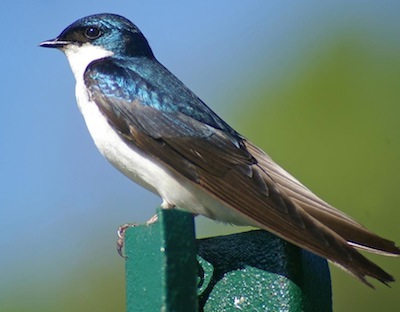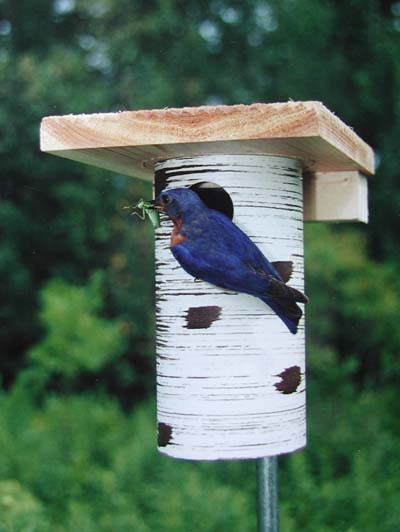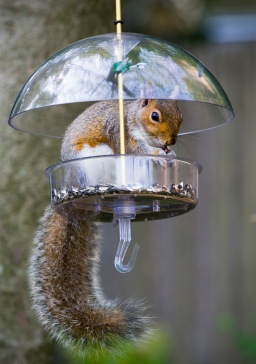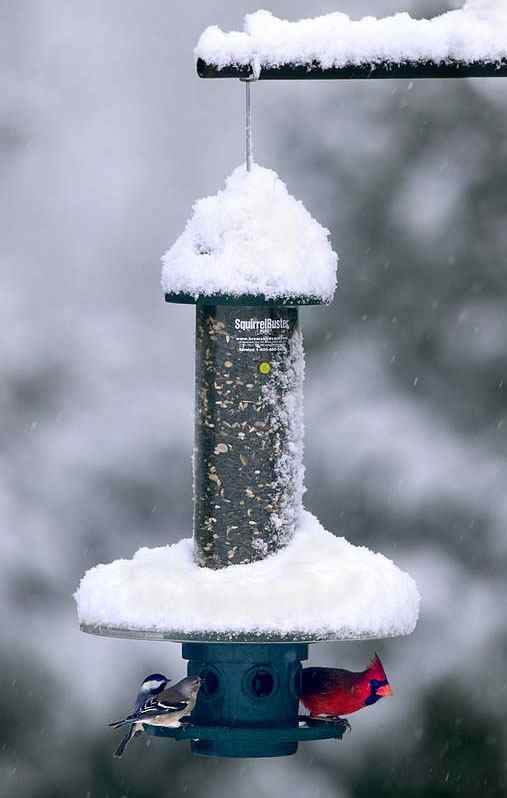-
Add a Ginko or Fern Near Butterfly Feeders
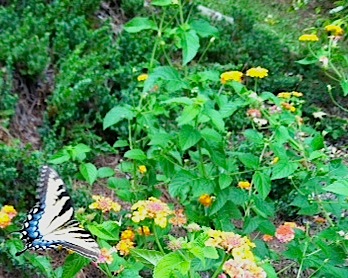 Nobody’s thinking butterflies just yet, but it won’t be too long! With several migrations underway, monarchs, swallowtails and others will be arriving soon. Their numbers are way down which is alarming to scientists, pesticides and climate change being key factors.
Nobody’s thinking butterflies just yet, but it won’t be too long! With several migrations underway, monarchs, swallowtails and others will be arriving soon. Their numbers are way down which is alarming to scientists, pesticides and climate change being key factors.If you’d like to have these pollinators gracing your garden, here’s a few simple things to consider:
•Call it quits and abandon the use of any pesticides and herbicides.
•Plant native flowers and shrubs to benefit the flying jewels. Two-part, for food and hosting the chrysalis. A simple search on the web will reveal an abundant list of options for your locale.
•Leaf misters are mighty appealing to butterflies. They’re simple to install and even portable, your garden will grow lush too as a result of the gentle spray of water!
•Add butterfly feeders, in the form of nectar producing flowers, over ripe fruit, or an actual feeder that offers nectar via wicks. The wicks re-create the way butterflies use their long middle antennae to draw nectar from flowers.
•Butterfly Houses? Not so much, but they do look awesome in the landscape!
•Try a stoneware butterfly puddler for a cozy place to warm themselves in the sun.
Aside from an artsy garden accent, they can be used as feeders or easily transformed into a waterless pond by adding some sand and salts. The Ginko is a new puddler available for 2014 that features a rich texture and natural color. Both styles are complete with instructions for best use.
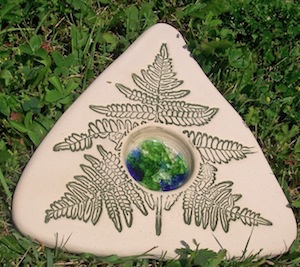
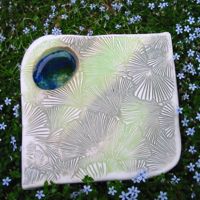 Help these flying jewels by creating habitat to lure and keep them around. Your garden and the butterflies will thank you!
Help these flying jewels by creating habitat to lure and keep them around. Your garden and the butterflies will thank you!Now if it ever greens up, we’ll get a cool shot of the new one actually being used in the landscape!
-
Tree Swallows Like Blue Bird Houses too
Their migration is underway! Lucky little fliers spend their winters in the Caribbean, Central America, and the Southern-most parts of Texas and California. They’re heading as far north as Alaska and Canada, seeking mates and natural nest cavities or birdhouses to raise their young. Competition for nest sites is brutal… real estate’s tough out there!
Dwindling and disappearing habitat being a major cause, with fewer snags (dead trees) left intact. Non-native birds are also seeking the same nest spots and put up one fierce fight for the right to claim territory. European starlings and house sparrows wreak havoc on tree swallows, purple martins and bluebirds alike. Just ask any landlord, most will have sad tale or two to tell. Many people who offer martin houses or blue bird houses will discourage these aggressive species in order to protect native songbirds.
A favorite house among our “blues” here in the southeast is the Gilbertson Nest Box, and tree swallows will commonly use them as well.
A sturdy vinyl nest box with wood roof, it’s easy to monitor and reasonably priced. You can get one for the bluebirds and one for tree swallows! Just don’t place them too close together. For best results, one in the front and one in the back is a pretty good rule of thumb.
Because all blue bird houses are not created equal, we highly encourage anyone serious about helping bluebirds to use houses approved by The North American Bluebird Society. When you see the acronym NABS… you’ll know!
Celebrate spring and help welcome all migratory friends from their long journeys North!
Nab 10% off site-wide on all bird houses, seed feeders, birdbaths and hummingbird feeders too. And don’t forget the nesting material… we’re giving that away free with all orders through May 15th!
Use promo code MC10
Now Come on spring 🙂 -
Squirrel Proof Bird Feeders for Rain, Sleet and Snow
When you’ve finally had enough of squirrel’s shenanigans, you know, chasing off songbirds, stealing all the food, and those constant acrobatics including hanging upside down from your bird feeder… it might be a good time for a one-time investment in squirrel proof bird feeders. Look at this guy acting as if he owns it!
Even if just one quality model that really works, absolutely lasts and has a lifetime warranty. For peace of mind and just to outwit the little critters once and for all, it’s so worth it.
Although this feeder has a dome or weather guard, it sure isn’t squirrel-proof. On the other hand, Squirrel Busters are, and they too now have an optional weather guard to keep seed dry and offer shelter while feeding.
Considering the amount of snow most of the country has seen this winter (and some still seeing it) the weatherguard could actually mean the difference between a meal and starvation for some feathered friends.
Dramatic? Consider that overnight lows with sub-zero temperatures take a wicked amount of energy for a bird’s survival mechanisms. Every calorie is accounted for, just to survive each night like that. Energy’s depleted by first daylight, so when the search for food begins, accessible feeders can be the difference between life or death. Not so dramatic in warmer weather 🙂
So how do these squirrel proof bird feeders work? First, there’s no batteries or power source to mess with, that’s convenient. An adjustable weight mechanism closes off seed access to squirrels, and bigger bully-birds too. Some other cage-type feeders may operate on this same principle, but they’re not as well made and don’t carry that lifetime warranty either. Like the Postal Service motto: Through rain, sleet and snow… your birds can eat!
Check out the video below, the squirrel action doesn’t start until about midway through, but there’s some cool close-up filming of cardinals, woodpeckers, goldfinches, titmice and other friendly fliers visiting for a bite to eat.

